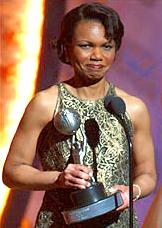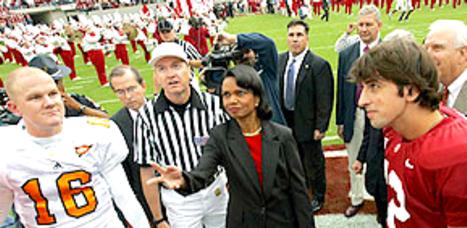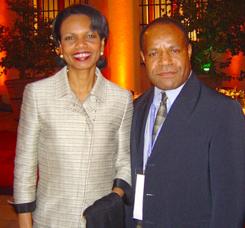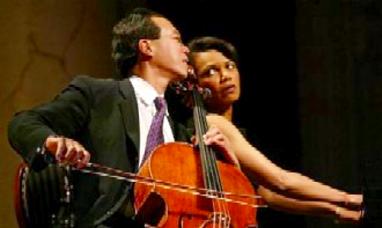
|

|

|
Her mother was a music teacher.
In 2002, Denise Hawkins, writing for Christianity Today, painted a flattering portrait of Ms. Rice. The article was meant to lay to rest any lingering reservations the periodical’s white Christian readers might have about a black woman advising the President on matters of national security.
The first thing Hawkins did was to establish Rice’s religious credentials. She quoted Rice on her relationship with God, “When I’m concerned about something, I figure out a plan of action, and then I give it to God. I just ask it to be carried through. God’s never failed me yet.”
After showing the faithful that God acted on memos from Rice, she turned to the lady’s less exalted childhood and related her unforgettable incident with racism as a seven-year-old black child in Birmingham, Alabama.
Hawkins wrote, “In 1961, Angelina Rice [Condoleezza’s mother] and her seven-year-old daughter were eyeing pretty dresses at a Birmingham department store, when a white saleswoman blocked Condi from trying on an outfit in the fitting room, which she said was reserved for white customers. The clerk directed them to a storage room designated for blacks. But Mrs. Rice was having none of that. She coolly informed the saleswoman that her daughter would change in the fitting room or that she would take her money, and the saleswoman’s prospective commission, to another store. Taken aback by the challenge, the clerk ushered them into a remote dressing room and stood guard at the door hoping no one would notice. It is a moment Rice will never forget.”
So Condi came from a family of good Negroes. Mrs. Rice addressed racism properly, without creating a scene, unlike Rosa Parks who sat at the front of the bus and started a revolution that, to this day, upsets so many nice white folks.
Rice said, “My father was not a march-in-the-street protester,” he believed in fighting racial injustice “with your mind.”
Condi told Hawkins how her parents raised her to be a smart Negro. She said, “My parents were very strategic. I was going to be so well-prepared and I was going to do all of these things that were revered in white society so well that I would be armored somehow from racism. I would be able to confront white society on its own terms.”
Thus the master plan was to succeed in life not as a black person but as someone who was white in everything but skin color. The right way was to “confront white society on its own terms” not “on black terms.”
When she spoke at the 2000 Republican Convention, Rice proclaimed, “My father was a Republican!”
However, Rice omitted a few details about her father, John Rice ...
Laura Flanders, author of Bushwomen: Tales of a Cynical Species, says John Rice supported Martin Luther King Jr. and Ralph Abernathy, became “the first administrator of Headstart, an educational affirmative action program that Bush is trying to kill,” and “as assistant dean of arts and sciences in the University of Denver in the [1970’s initiated a seminar series on the black experience in America that brought speakers to talk about white supremacy as a structural problem in the US and its continuing legacy.” Among the invited speakers were an exiled poet from the apartheid regime of South Africa and one Louis Farrakhan of the Nation of Islam.
At age 15 Rice went to the University of Denver Colorado to study music. She soon realized that being just a “pretty good” pianist was not going to get her beyond teaching 13-year-olds to murder Beethoven for a living.
Condoleezza took a course in Eastern European studies taught by Joseph Korbel a former Czech diplomat and father of Clinton’s Secretary of State Madeleine Albright. Joseph Kurbel (his Jewish surname) was so impressed by Condoleezza he persuaded her to major in politics instead of music ... launching Condoleezza into the even bleaker career of sending young Americans (disproportionately young disadvantaged black Americans) to kill Iraqis.
During the Clinton presidency, Rice joined Chevron as a board member. At that time Chevron was pumping oil in the Niger Delta and enjoyed a cozy relations with that country’s brutal dictatorship. When locals mounted a series of protests against Chevron “regarding jobs, clean water and access to health care,” the dictatorship answered the protesters’ demands by mowing them down.
As a result, Chevron shareholders asked the company to review its relations with the dictatorship.
Flanders notes, “Rice was on the social policy committee of the board that received these resolutions and in every case, rejected sending them to the full board for consideration.”
Rice’s apathy to the plight of her fellow blacks recalls columnist Frederick Hudson’s comparison of Rice to the black maid in Guess Who’s Coming to Dinner who says to Sidney Poitier, “I’m not going to put up with any black power mess in this house.”
In 1984, Rice wrote a book called The Soviet Union and the Czechoslovak Army, 1948-1983, Uncertain Alliance ...
Joseph Kalvoda, a professor from St. Joseph’s College in Connecticut, reviewed the book.
He said, “Rice’s generalizations reflect lack of knowledge about history and the nationality problem in Czechoslovakia.” He pointed out glaring factual errors in her book. For example, in the opening pages of her book, Rice said, “In 1939 and 1948, the Czechoslovak president, Edward Benes, ordered his troops to barracks, Dubceck and Svoboda were then just following precedent. Czechoslovak passivity meant the decision of 1968 was preordained.”
Kalvoda said, “Rice claims that Czechoslovaks are supposedly passive and consider resistance to invading forces unnecessary and dangerous, preferring instead, the political solution
He points out, “In 1939, Benes was no longer president but was teaching at the University of Chicago.” And he adds, “First, there are Czechs and Slovaks but not Czechoslovaks. Second, history shows Czechs resisted Prussian invading forces in 1866, the Germans in 1939 ... amongst others”
Rice also compared Poland in 1981 to Czechoslovakia in 1968 and Kalvoda’s reaction to that was, “Rice does not mention the obvious—Soviet troops had been garrisoned in Poland since the end of World War 2, so an invasion was unnecessary—whereas the 1968 invasion of Czechoslovakia was to force Dubcek’s regime to accept the stationing of Soviet troops.”
Kalvoda concludes, “Much of this book by Condoleezza Rice is based on secondary work. Rice’s selection of sources raises questions since she frequently does not sift fact from propaganda and valid information from disinformation or misinformation.”
For some reason, Brent Scowcroft, Poppy Bush’s national security adviser, was impressed by Rice’s scholarship. He hired her to work in the National Security Council (NSC), first as director, then as senior director of Soviet and East European Affairs. She was, at the same time, special assistant to the president for national security affairs.
At his first summit with Gorbachev in Malta, Poppy Bush introduced Rice as the woman “who tells me everything I know about the Soviet Union.”
Poppy Bush missed the boat on the breakup of the Soviet Union and got off on the wrong foot with Yeltsin because Rice advised him to “support Gorbachev and his vision of a reformed Soviet Union.”
Flanders relates an incident when Rice “physically blocked the door to the Oval Office to prevent Yeltsin from meeting with the President” and a speech where Bush “urged the people of Ukraine to remain loyal to Moscow” instead of pushing for their independence. An NSC staffer admitted, “ She was wrong but she was loyal.”
During the Iran-Iraq war, the NSC came under fire from the United States Congress for “skewing intelligence to mislead Congress into permitting arms sales and loans to Saddam.” Access to anthrax and botulinium toxins were only blocked after Saddam invaded Kuwait.
When Junior hired Condoleezza, he said, “America will find that she is a wise person. I trust her judgment.”
The younger Bush, following daddy’s footsteps, also entrusted Rice with skewing intelligence about Iraq. This time, however, it was to mislead Congress into supporting an attack on the very same man she misled Congress to arm many years ago.
Her performance before and after 9/11, the lies and the resulting fiasco in Iraq are all too fresh to bear repeating.
People wonder how Rice survived her blunder about the Soviet Union and managed to gain Junior’s trust and eventual promotion to Secretary of State despite her dismal performance as National Security Adviser ...
Well, the Bushes value loyalty above all.
In summing up Rice, Flanders said: “Don’t judge Rice too harshly. The National Security Adviser’s expertise has never been serving the nation, it has been serving the house of Bush.
At the first job, she has been a disaster. At the second she is the best.”
(Perhaps Condoleezza suffered from innocently trusting the words of her Eastern European Studies mentor Joseph Kurbel ...
may be she is aware of that now ... me)

|
(By MANUEL BUENCAMINO, Buencamino does foreign affairs analysis for Action for Economic Reforms.)
(Corrections additions and other editing by me)